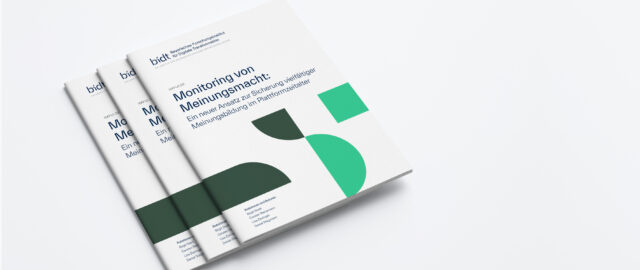The legal core of the bidt-funded interdisciplinary project Coding Public Value has taken a stand on the draft of the Media State Treaty (MStV-E). This aims in particular to provide public broadcasting with the legal framework needed for the digital transformation. In the blog post, the author and the author highlight that and which of their project findings will be taken up by the MStV-E.
In October 2021, the Broadcasting Commission of the Länder presented a discussion draft on the mission and structural optimisation of public service broadcasting, on which comments could be made until mid-January 2022 within the framework of a consultation procedure.
The proposed amendment contains aspects that were identified in the bidt-funded research project “Coding Public Value” as important challenges in the modernisation of public broadcasting. Thus, as early as spring 2021, the legal team of the project “Coding Public Value” worked out an analysis in the form of a legal expert opinion on which requirements arise from the broadcasting constitutional law and the current State Media Treaty (MStV) for the design of online offerings of public service providers. A central result was that the dimensions of the constitutional functional mandate also extend to the software systems on which the online offerings are based. Because their functions (also) have an impact on the mediation of public service content – and thus on the perceivable and perceived diversity – these systems have direct references to the fulfilment of the normative mandate. The previous requirements for the consideration of “internet-specific means of design” can hardly reflect this relevance so far.
The current draft of the Länder takes up these considerations – among other aspects: Thus, the draft provides in Section 30 (4) MStV-E that broadcasters must offer their online recommendation systems in such a way that “they enable an open opinion-forming process and broad discourse on content”. Such recommendation systems are to be understood as filter mechanisms which, based on personal preferences or the context of reception, for example, automatically provide users with suggestions for further content reception. With the chosen wording, the legislator would make it explicit that specific requirements for recommendation systems must be observed for the online mediation of public service content, which do not exist in this form for private media platforms.
As co-authors of the analysis, we have now submitted a statement within the framework of the consultation procedure which welcomes this planned requirement. However, we also point out that so far there is a lack of best practice approaches on how such vague legal requirements can be mapped into data and software functions. Complex procedures are needed here, in which experts with legal and democratic theoretical background knowledge, together with software engineers, make their knowledge fruitful for software development that meets the legal requirements. The challenges of such “translation services” are not trivial.
It is not only about the phase of concretising the legal requirements within the framework of the necessary software requirements engineering but also about the reflexive review and documentation of the extent to which the system later actually complies with these requirements. The “Coding Public Value” project at bidt will continue to develop approaches for such interpretation and development procedures until mid-2023.
The discussion draft also obliges the internal supervisory bodies of the broadcasters in Section 31 (2c) MStV-E to draw up such procedures and to subsequently check their implementation. These are to establish quality standards in terms of content and form as well as standardised processes, on the basis of which a review of compliance with the legal requirements is possible. This will give the pluralistic television and radio councils of the public service media providers more options and power, also with regard to the requirements for the software development of the respective broadcaster. For this, as we also make clear in our statement, the committees must be better equipped, also with regard to the expertise necessary for this.
The statement also addresses other aspects of the discussion draft that concern the digital transformation of public service broadcasting.
The “Coding Public Value” project
The project, in which the Leibniz Institute for Media Research | Hans Bredow Institute is involved with its legal expertise, identifies and analyses such legal requirements as well as societal and stakeholder expectations of public service software, for example in the area of search functions, recommendation systems and automatic content filters. Through interviews, document analyses and joint workshops, the research project, in close exchange with broadcasters and stakeholder groups, aims to identify options for the future concretisation and implementation of software-related “public value”, which could be taken up in future Telemedia concepts if necessary. A first working paper will be published shortly, which will present an analysis of the regulatory framework for such technologies and make initial suggestions as to how they can be designed in the future, taking into account various requirements placed on public service broadcasting.
Opinion and expert report
Rhein, Valerie / Dreyer, Stephan / Schulz, Wolfgang (2022). Schriftliche Stellungnahme zu dem Diskussionsentwurf zu Auftrag und Strukturoptimierung des öffentlich-rechtlichen Rundfunks. Hamburg, 13 January 2022.
Rhein, Valerie / Dreyer, Stephan / Schulz, Wolfgang (2021). Rechtliche Vorgaben für die Gestaltung von Software öffentlich-rechtlicher Medienplattformen. Gesetzliche und verfassungsrechtliche Programmaufträge und deren Abbildbarkeit in Strukturen, Verfahren und Code. Hamburg: Verlag Hans-Bredow-Institut, May 2021.
The blog contributions published by bidt reflect the views of the authors; they do not reflect the position of the Institute as a whole.



